University Catalog 2023-2024 [ARCHIVED CATALOG]
California State University, Los Angeles
|
|
 Return to: Colleges & Departments Return to: Colleges & Departments
The UniversityIndex
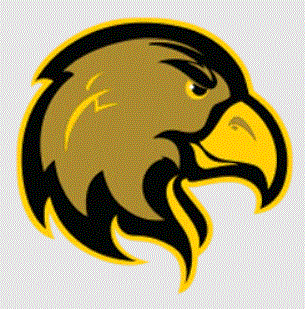
California State University, Los Angeles, founded in 1947 by the California State Legislature, is a comprehensive University that offers programs of higher education in an array of academic and professional fields. The University’s six Colleges, along with the Honors College and College of Professional and Global Education, offer more than 60 academic schools, divisions and departments that draw students from all areas of the United States and the world. About one quarter of the campus’ more than 27,000 students are engaged in postbaccalaureate study in programs leading to master’s and doctoral degrees; teaching, service, and specialist credentials; certificates; and programs that lead to professional and academic advancement.
|
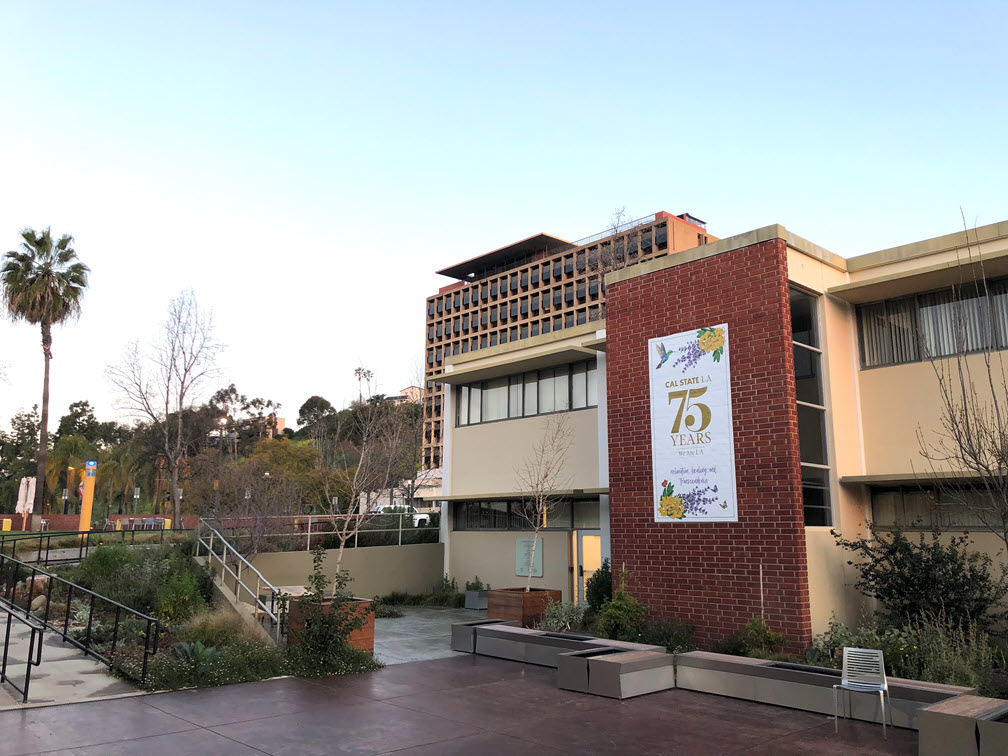 |
The Campus Reflecting L.A.
At the heart of Los Angeles, Cal State LA sits upon just over 175 acres with views of Pasadena and the mountains to the north, the San Gabriel Valley to the east, downtown Los Angeles to the west, and the Palos Verdes Peninsula and Catalina Island to the south. The Cal State LA Transit Center makes the University highly accessible by trains and buses serving all regional communities.
The campus site was once one of California’s 36 original adobes, built in 1776 by Franciscan missionaries and destroyed by fire in 1908. Around the 1850s, it was settled as part of a Spanish land grant by the family of Juan Batista Batz, a Basque rancher from northern Spain. Known as the Rancho Rosa Castilla, it was named, according to local historians, for the wild rose that grew near the home. The name of the main drive through the campus harkens back to this historic heritage.
The Faculty
Members of the Cal State LA faculty are well recognized for their academic and teaching excellence, through high levels of scholarship, research, mentoring, and creative accomplishments. Virtually all of Cal State LA’s faculty members have earned the highest degrees in their field, most often a Ph.D., from leading universities. Cal State LA professors have been acknowledged as outstanding professors within the CSU system and at the state and national levels and have received numerous grants and awards, including several Fulbright grants.
|
|
|
The greatest commitment of Cal State LA faculty is to teaching. Faculty members regularly involve students, including undergraduates, in research and creative activities, mentoring them through academic and career advisement. Various campus programs and University committees, on which students also serve, further develop supportive ties between faculty and students.
|
The Academic Year/Semester System
California State University, Los Angeles operates on a semester system, which is supplemented by fee-supported summer (10 weeks), winter (3 weeks), and May (3 weeks) intersessions. Normally, fall semester classes begin in early August and end in early December. Spring semester classes normally begin in late January and end in mid-May. Both the summer and May terms begin in late May. Students may maintain normal academic progress by full-time attendance during any two semesters of each year. Classes are scheduled weekdays from 7 a.m. until 10 p.m. and on Saturdays to serve the needs of both full-time and part-time students.
Construction Updates
|
Construction updates since 2009:
The Wallis Annenberg Integrated Sciences Complex
The Wallis Annenberg Integrated Sciences Complex is home to the College of Natural and Social Sciences.
This complex encompasses La Kretz Hall, Wing B, and the Lloyd Ferguson Courtyard. It includes classrooms, labs, and offices for a number of science-based fields of research and study.
|
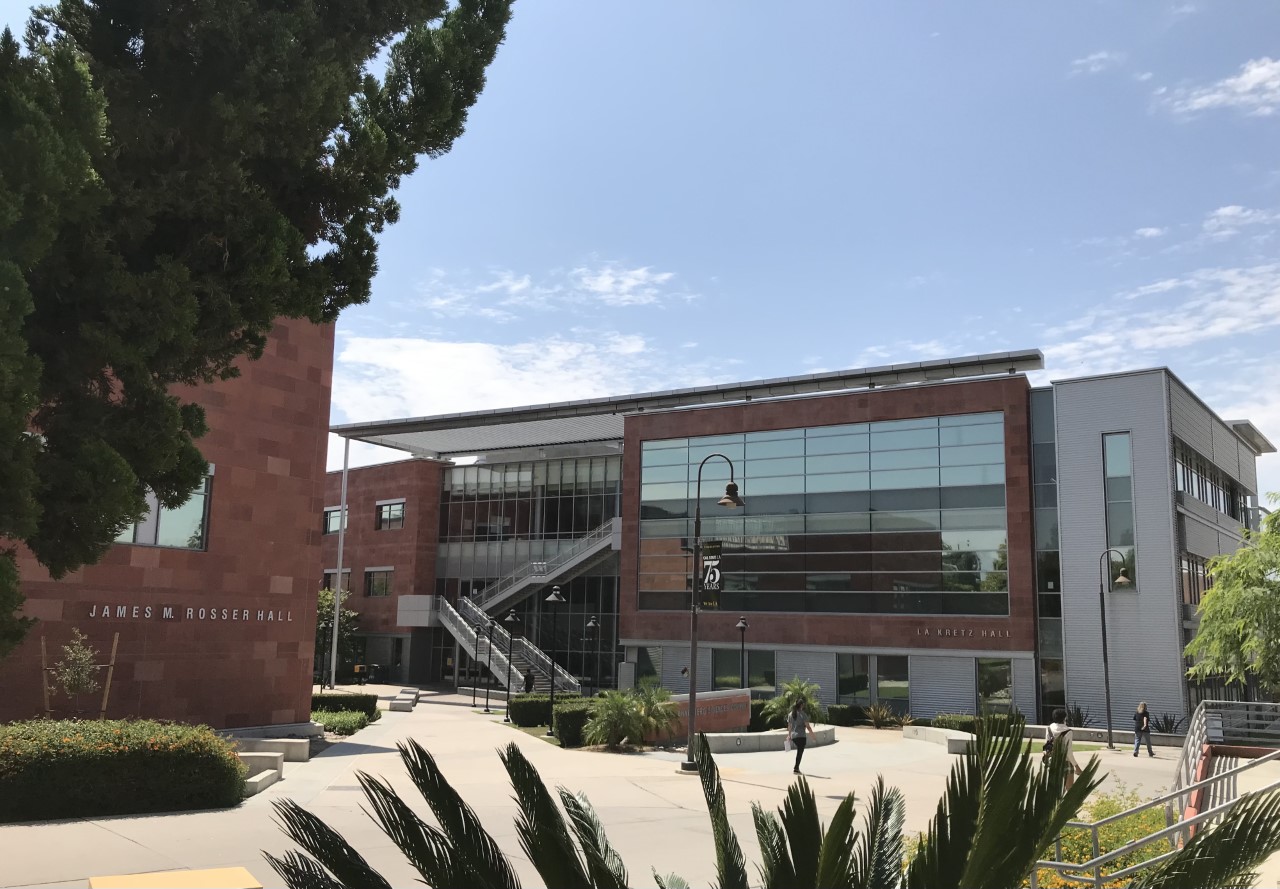 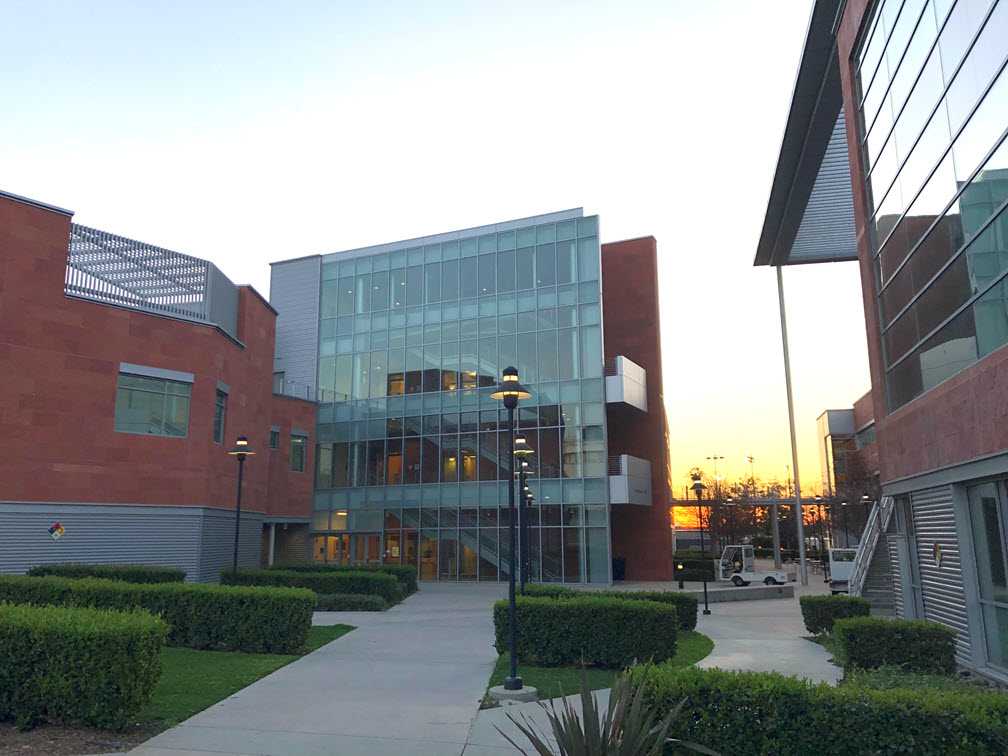 |
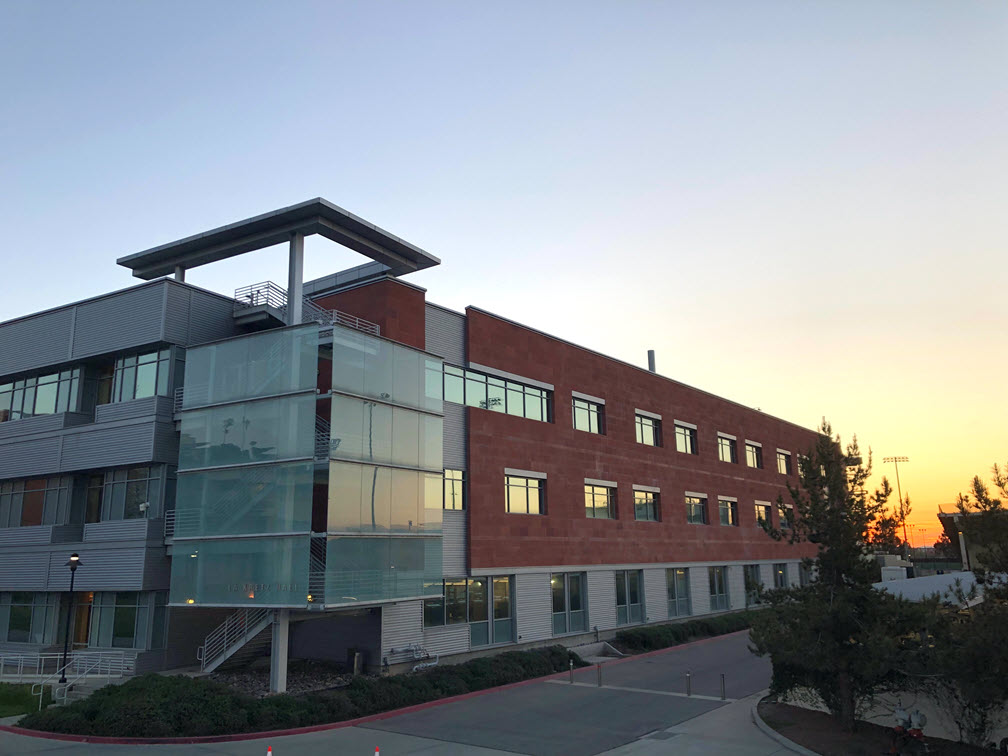 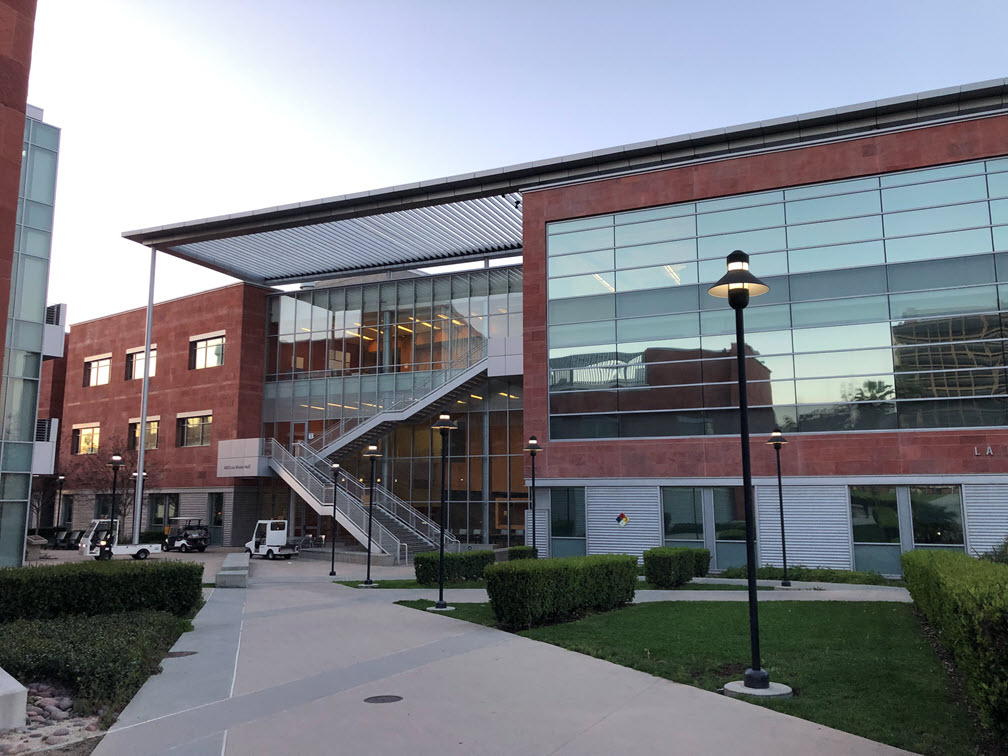 |
The Corporation Yard
Key operations that ensure the University can function are housed in the two new structures that encompass Facilities Services; Facilities Planning and Construction; Risk Management and Environmental Health and Safety; Materials Management; and Shipping and Receiving.
Student Housing: Golden Eagles Apartments and South Village
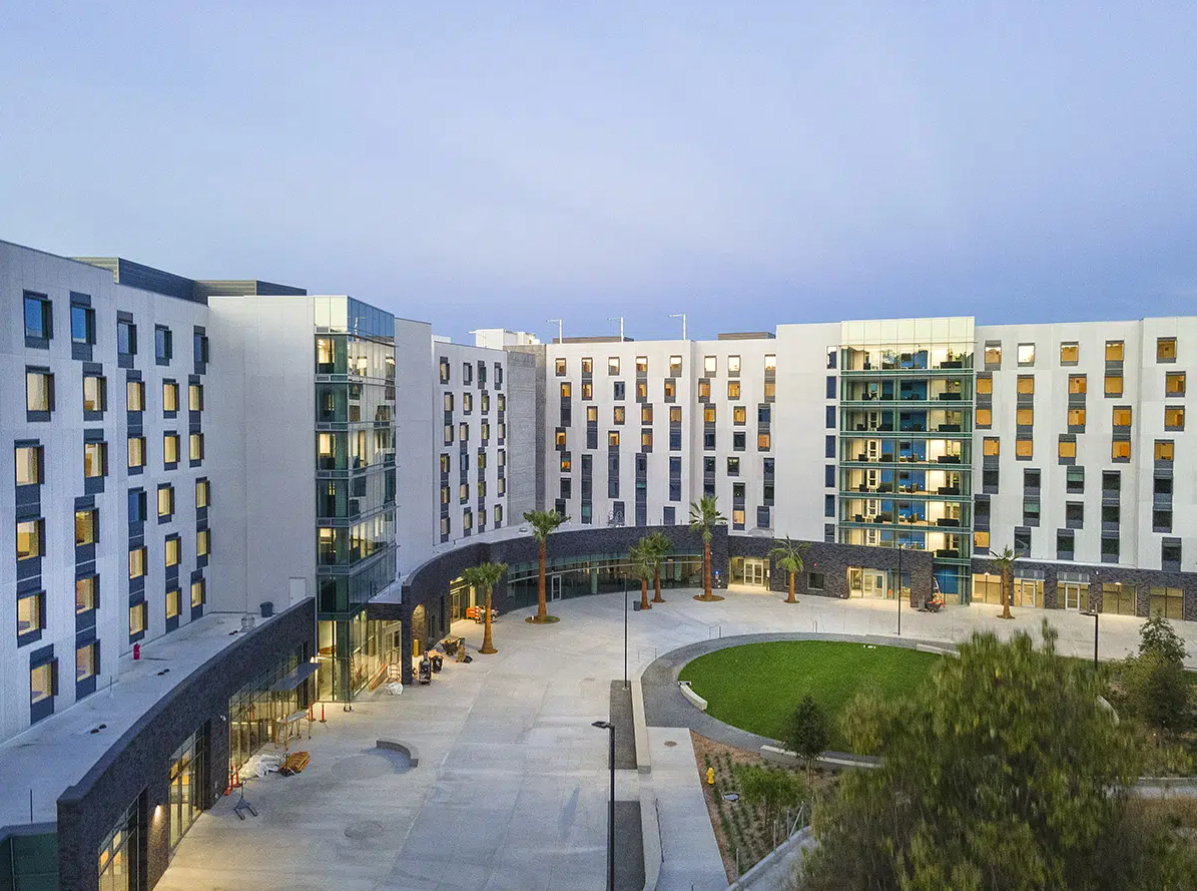 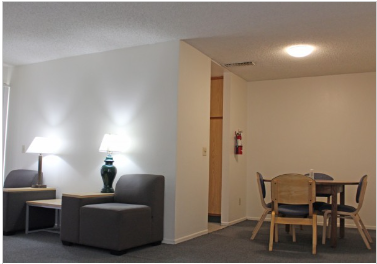 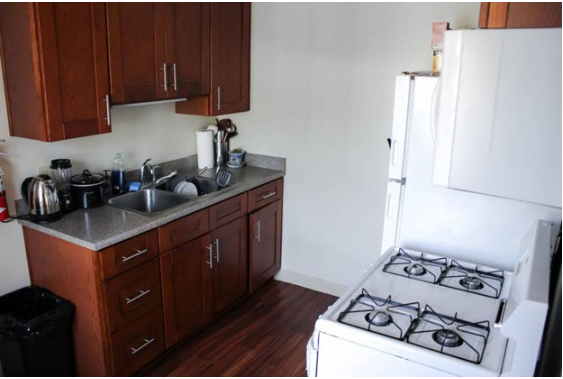
Hydrogen Fueling and Research
The Cal State LA Hydrogen Research and Fueling Facility (H2 Station) was formally opened on May 7, 2014. As the largest university-located hydrogen fueling facility in the nation, commissioning continues and the facility is now available to Fuel Cell Electric Vehicles (FCEVs). The station is capable of producing hydrogen onsite from renewable energy sources, using the process known as electrolysis. FCEVs’ fueling at the station emits only water vapor emissions!
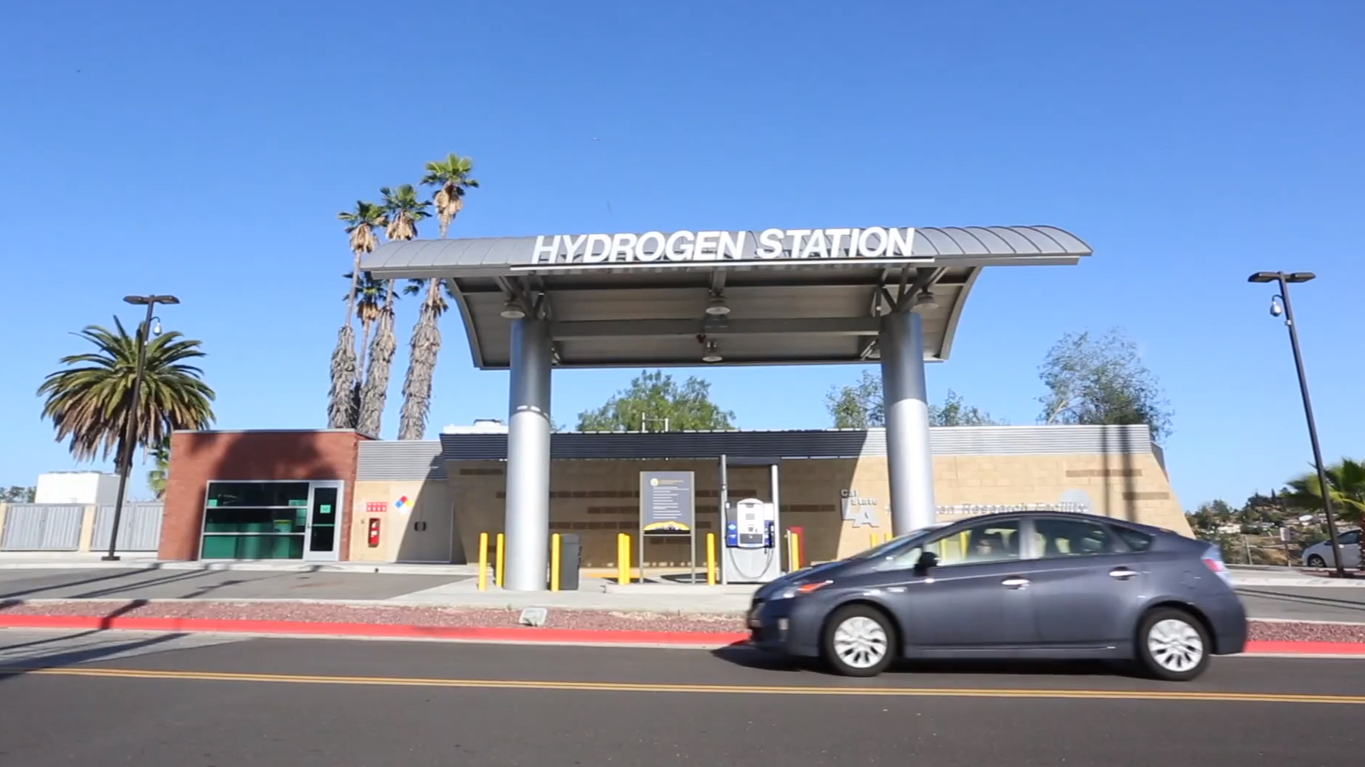
|
Public Safety / University Police
Dedicated to the safety and protection of the entire campus community, the home of Public Safety/University Police, accredited by the Commission on Accreditation for Law Enforcement Agencies, is near the campus entrance and adjacent to The Welcome Center. The facility features all modern amenities and services needed to protect and serve a large campus community. Website: https://www.calstatela.edu/police
.png)
|
Television, Film and Media Studies Center
The Television, Film and Media Studies Center, part of the College of Arts and Letters, offers students access to state-of-the-art technology, along with innovative creative opportunities. The site of the former Church of Jesus Christ of Latter Day Saints includes a two-level parking structure and a multi-use room, classrooms, conference rooms, and office space.
|
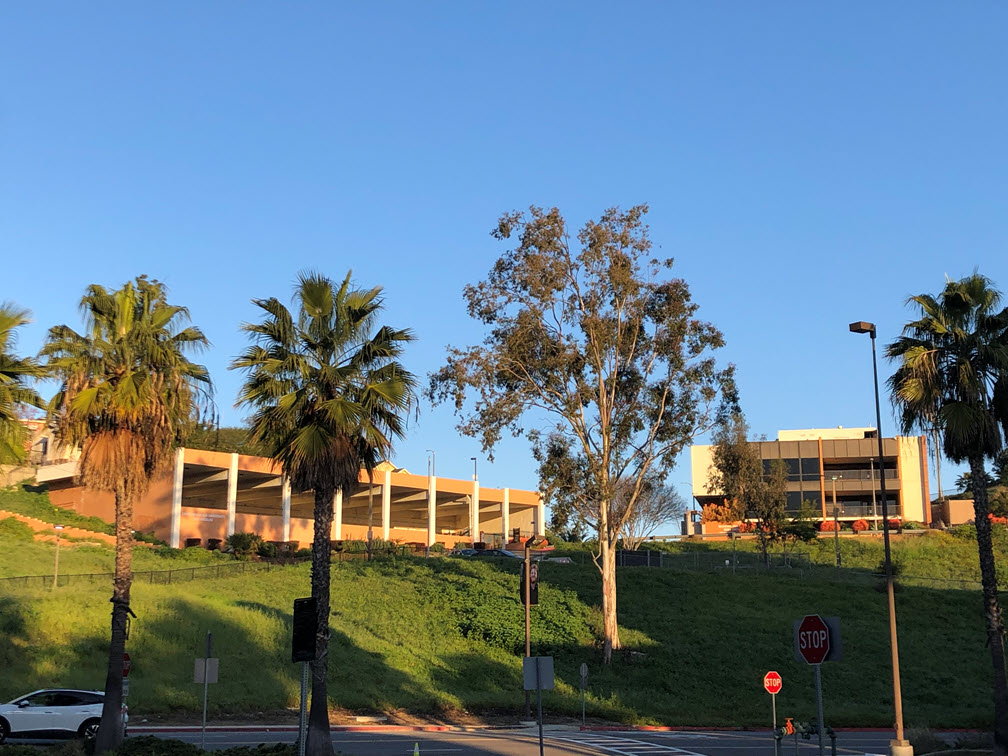 |
| |
University-Student Union and The Golden Eagle
The University-Student Union is home to the Alumni Center and Associated Students, Inc. (ASI) offices, along with clubs and organizations. The U-SU offers an extensive fitness center, theatre, computer lab, and meeting rooms that connect to The Golden Eagle via a third-floor bridge. The Golden Eagle, home of the Pat Brown Institute and the College of Professional and Global Education, also includes a food court, campus catering services, the University Club, a bookstore and major conference facilities.
|
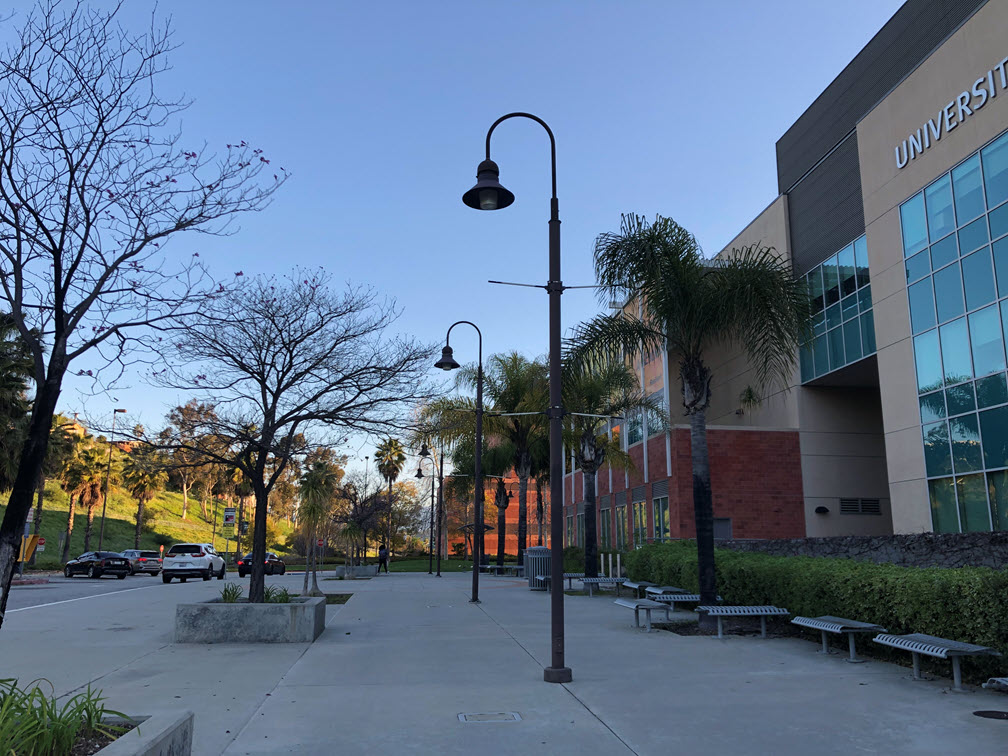 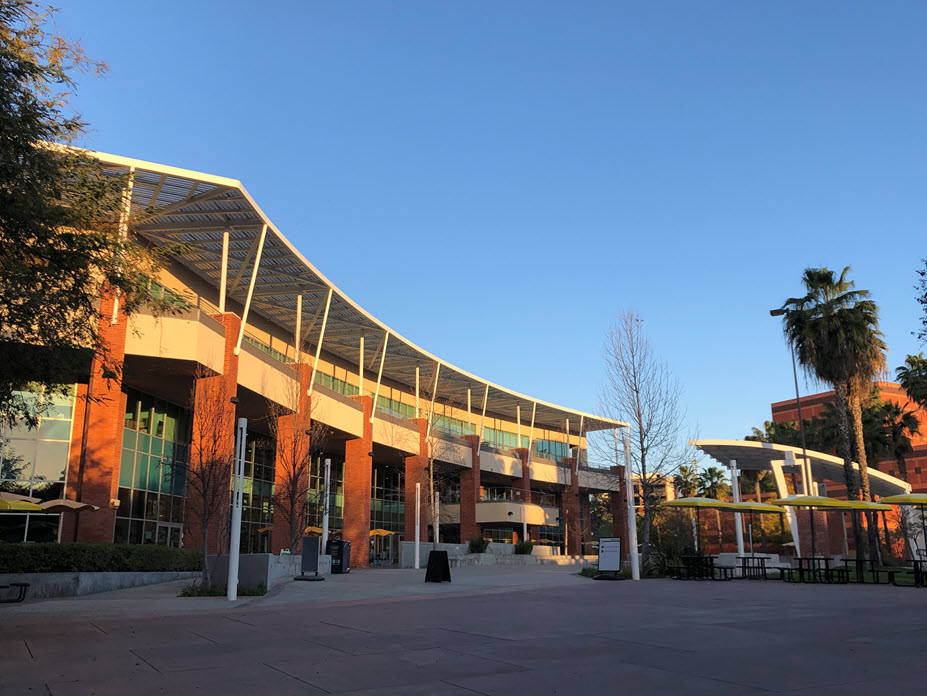 |
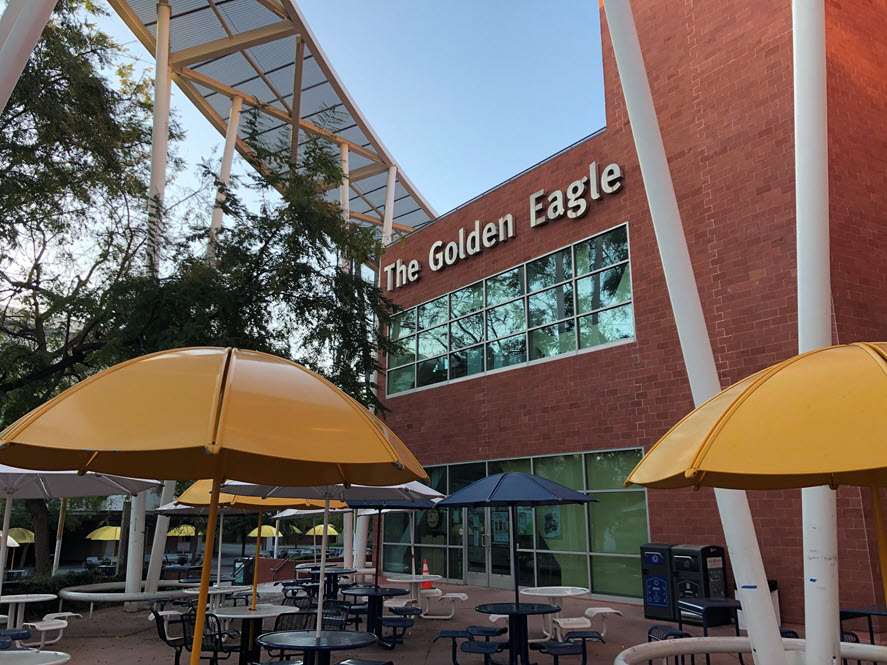 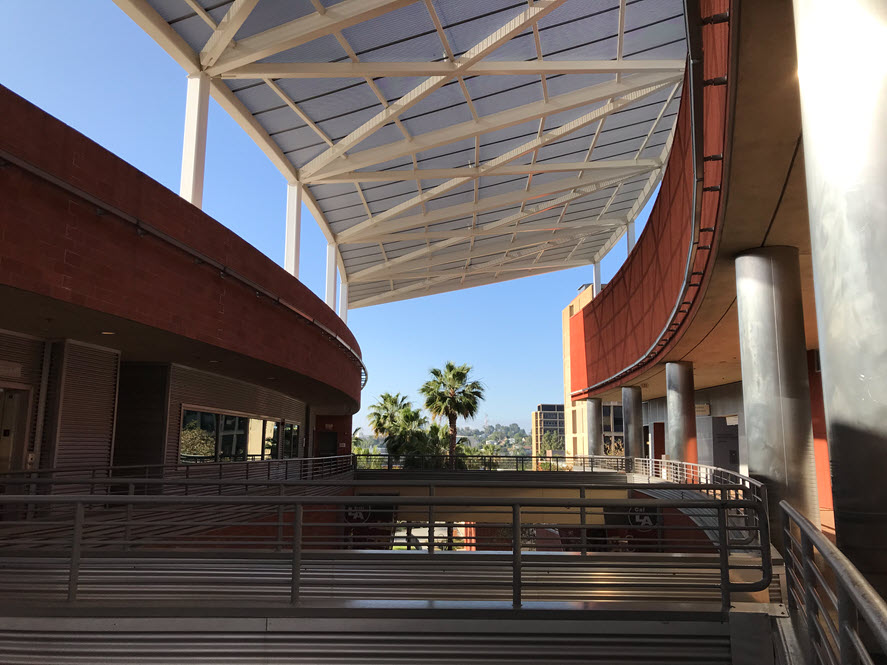 |
|
Los Angeles County High School for the Arts (LACHSA)
The Los Angeles County High School for the Arts (LACHSA) offers a specialized program combining college-preparatory academic instruction and conservatory-style training in the visual and performing arts. Located north of the Music building between Parking Structure C and Student Housing, the new school building is a shared facility with Cal State L.A. LACHSA is Building #20 on the campus map. Please visit the LACHSA website for the most current information at: http://www.lachsa.net/.
Marc and Eva Stern Math and Science School (Stern MASS)
A collaboration between the Alliance for College-Ready Public Schools (a charter management organization) and Cal State L.A., Stern MASS focuses on preparing students to pursue college degrees in the science, technology, engineering, and mathematics (STEM) fields. The building, housing 22 classrooms, four science labs, a multipurpose room, a library, and a CSULA professional development center, was dedicated in 2009. Stern MASS is Building #26 on the Cal State LA map. Please visit the school website for the most current information at: https://www.sternmass.org/.
|
Affiliations
Cal State LA holds membership in a number of national and regional organizations concerned with the advancement of higher education. They include the American Council on Education (ACE), the American Association of State Colleges and Universities (AASCU), the Association of American Colleges and Universities (AAC&U), the Association of American Colleges, Council of Graduate Schools, National Collegiate Honors Council, Western Association of Graduate Schools, and the Western Association of Schools and Colleges (WASC). Women graduates are qualified for membership in the American Association of University Women (AAUW).
The John F. Kennedy Memorial Library
The John F. Kennedy Memorial Library supports Cal State L.A.’s academic programs through collections, technology, services and instruction that facilitate student and faculty access to a broad range of recorded knowledge and information resources. The Library provides well-organized and effective access to both local and remote sources. Electronic resources are accessible to CSULA students, wherever their location, through the Internet. The Library provides access to knowledge resources and information appropriate to each College’s departments and programs, along with needed instruction and support. The Library offers user-oriented assistance in selecting, locating, and using resources. Its instructional program fosters life-long learning and develops competency in the use of resources and research methodologies. Please visit the library website at https://www.calstatela.edu/library/about for more information.
Information Technology Services (ITS)
Information Technology Services (ITS) provides the technology infrastructure, support services and resources that support the University’s Strategic Directions and Goals and ensures that information security assurance remains an institutional priority. ITS strives to provide all students, faculty and staff with anywhere, anytime electronic access to information resources in support of the teaching/learning mission of the University. To guide the University toward a future technology environment featuring even richer and more robust services, the division provides planning, collaboration, training, development, implementation and stewardship of technology and information resources.
Information security assurance is an institutional priority for Cal State L.A. Everyone on campus is responsible for protecting confidential information in every format: electronic or printed. Ongoing and vigilant efforts by the entire campus community to safeguard University information, resources, reputation and integrity are vital. For more on information security, please call 323-343-2600 or go to https://www.calstatela.edu/its/it-security-and-compliance.
International Programs
Developing inter-cultural communication skills and international understanding among its students is a vital mission of the California State University (CSU). Since its inception in 1963, the CSU International Programs (CSU IP) has contributed to this effort by providing qualified students an affordable opportunity to continue their studies abroad for a full academic year in all programs and a semester option in some countries and programs.
More than 20,000 CSU students have taken advantage of this unique study option. Also, through the CSU IP exchange partnerships, more than 5,000 international students have come to study at the CSU.
International Programs participants earn resident academic credit at their home university while they pursue full-time study at a host university or study center abroad. CSU IP serves the needs of students in more than 100 designated academic majors. Affiliated with nearly 60 recognized universities and institutions of higher education in 18 countries, CSU IP also offers a wide selection of study abroad destinations and learning environments.
|
Country
|
Institutions
|
|
Australia
|
Griffith University, Macquarie University, Queensland University of Technology, University of Queensland, Western Sydney University
|
|
Canada
|
Concordia University
|
|
Chile
|
Pontificia Universidad Católica de Chile
|
|
China
|
Peking University (Beijing)
|
|
Denmark
|
Danish Institute for Study Abroad
|
|
France
|
Institut Catholique de Paris, Institut Supérieur d’Electronique de Paris, Université d’Aix-Marseille (Aix-en-Provence), Université de Cergy- Pontoise, Universités de Paris I, III, IV, VI, VII, VIII, X, XI, XII, XIII, Université Paris-Est Marne-la-Vallée, Université d’Evry Val d’Essonne, and Université de Versailles Saint-Quentin-en-Yvelines
|
|
Germany
|
University of Tübingen, and a number of institutions of higher education in the Federal state of Baden-Württemberg
|
|
Ghana
|
University of Ghana
|
|
Israel
|
University of Haifa
|
|
Italy
|
CSU Florence Study Center, Accademia di Belle Arti Firenze
|
|
Japan
|
Waseda University, University of Tsukuba
|
|
Mexico
|
Instituto Tecnológico y de Estudios Superiores de Monterrey, Campus Querétaro
|
|
South Africa
|
Nelson Mandela University
|
|
South Korea
|
Yonsei University
|
|
Spain
|
Universidad Complutense de Madrid, Universidad de Granada, Universidad de Jaén
|
|
Sweden
|
Uppsala University
|
|
Taiwan (R.O.C.)
|
National Taiwan University (Taipei)
|
|
United Kingdom
|
University of Bradford, University of Bristol, University of Hull, Kingston University, Swansea University, University of Birmingham
|
Students participating in CSU IP pay CSU tuition and program fees and are responsible for airfare, accommodations, meals, and other personal expenses. Financial aid, with the exception of Federal Work-Study, is available to qualified students and limited scholarship opportunities are also available. All programs require students to maintain good academic and disciplinary standing, many programs are open to sophomores or graduate students. California Community College transfer students are eligible to apply (to select programs) directly from their community colleges. Students must possess a current cumulative grade point average of 2.75 or 3.0, depending on the program, and must fulfill all coursework prerequisites. Additional program information and application instructions can be found on the International Programs Website.
College of Professional and Global Education (PaGE)
The College offers a wide range of accessible programs and courses that prepare individuals to be successful in meeting their career and personal goals. Whether at Cal State LA’s main campus or at Cal State LA Downtown, the College blends applied learning and experiential knowledge to develop pathways for personal and professional enrichment. Please visit the College’s website at https://www.calstatela.edu/page for information on the programs, special sessions, and enrollment.
Reserve Officer Training Programs
Air Force ROTC
The Air Force Reserve Officer Training Corps (AFROTC) program’s mission is to develop young men and women into quality leaders for the United States Air Force. Air Force ROTC prepares college students to become Air Force Officers while also earning their college degrees. Air Force ROTC also offers a variety of scholarships for students currently in college that can help relieve the financial burden of earning a college degree.
The program consists of a one-hour academic course for first and second-year students and a three-hour course for third and fourth-year students. All students must also participate in a weekly one-hour physical training session and a two-hour leadership laboratory that facilitates the application of leadership theory.
Students attending Cal State LA can participate in Air Force ROTC at the University of California, Los Angeles (UCLA). For more information, please contact UCLA at (310) 825-1742 or visit www.afrotc.ucla.edu
Army ROTC
The Army Reserve Officers Training Corps (AROTC) program is available to qualified Cal State LA students via the University of California, Los Angeles (UCLA) program. Students must follow Cal State LA dual registration procedures. Students are encouraged to contact UCLA ROTC for instructions on how to cross-enroll into a UCLA course.
AROTC offers interested students an opportunity to enroll in courses focused on leadership, military tactics, and law, orienteering, rappelling, first aid, and national security. Participants must be physically qualified and be full-time undergraduate or graduate students. Students may take one Army ROTC course per quarter at UCLA while pursuing a regular college degree at Cal State LA Academic credits earned in the program normally may be counted as electives within regular college degree requirements. Completion of a regular degree and AROTC class requirements may lead to a commission as an officer in the U.S. Army, Army Reserve, or Army National Guard. Upon graduation, officers serve in supervisory-level positions in military intelligence, law, aviation, communications, engineering, finance, nursing, and more.
Two, three, and four-year AROTC scholarships cover (a) full tuition or housing up to $10,000, (b) a $900 allowance for books and fees, and (c) a monthly allowance of up to $500 while the student is enrolled in school. Veterans are eligible to receive the monthly allowance as well as G.I. Bill benefits. U.S. citizenship is required for scholarship acceptance. Permanent resident students may participate in classroom and outdoor training but are ineligible for benefits until naturalized.
For further information, contact the Department of Military Science at UCLA, at (310) 825-7381 or armyrotc@milsci.ucla.edu.
The Alumni Association
The Cal State LA Alumni Association is a self-supporting nonprofit, dues-paying membership organization whose goals include engaging alumni, students, and the campus community with the University.
The Association plays an important role on the campus to advocate for alumni interests. Cal State L.A.’s more than 215,000 graduates remain a vital and active catalyst in the University’s growth and visibility. Alumni volunteers are active on campus committees and are in a unique position to provide advice and counsel to the University community.
The Association plans and implements programs and events for alumni, students, and the University community. Perhaps the most visible program is the Alumni Awards Gala, which is held in the Luckman Fine Arts Complex and honors distinguished alumni, faculty, students, and friends of Cal State L.A. Past award winners include; tennis professional Billie Jean King ‘79, Clippers owner Donald T. Sterling ‘56, President of the San Francisco Zoo Manuel Mollinedo ‘70 ‘73 ‘77, and Diane Watson ‘67, U.S. Congress 33rd District. A list of distinguished alumni and the honorees of the last awards are posted on the Distinguished Alumni page on this catalog.
For the most current information about the Alumni Association, please visit the Association’s website at: https://www.calstatela.edu/alumni/about-us. The new Alumni Center is located in the University-Student Union, room 102; phone number: (323) 343-ALUM (2586) or email at alum@cslanet.calstatela.edu.
Cal State L.A. University Auxiliary Services, Inc. (UAS)
Cal State L.A. University Auxiliary Services, Inc. (UAS) is a recognized organization of the California State University system and is a nonprofit corporation, dedicated to benefiting the welfare of California State University students, faculty, staff, and alumni. The primary mission of UAS is to help develop and administer contracts and grants; operate and manage University related commercial enterprises; manage and support externally funded projects including research, workshops, and conferences, and to provide contributions that aid and supplement the University’s educational mission. Working together, the University community and UAS endeavor to ensure Cal State L.A.’s continued success.
The main operations of UAS include the following services to the University community: contracts and grants administration; bookstore contract management; operation and management of campus food services; and child care services.
UAS also manages the 103,000-square-foot Golden Eagle building. Opened in 2003, the building - two adjoining structures separated by a promenade - houses food services, including a food court with seating for approximately 750, kitchen and catering operations, a 600-seat banquet and conference center, the University Club restaurant, the 25,000 square-foot two-story University Bookstore, as well as UAS administrative offices, the University’s Office of Research & Sponsored Programs (ORSP), the Golden Eagle Service Center, classrooms and meeting spaces for the CSULA College of Extended Studies and International Programs and the Pat Brown Institute.
The policy-making responsibility for the UAS is vested in its board of directors, whose members represent a cross-section of the campus community and local service area. For more information, visit the UAS website at https://www.calstatela.edu/uas
Endowed Chairs
Joseph A. Bailey II, M.D. - Endowed Chair in American Communities
The endowed chair in American Communities is housed in the College of Arts and Letters. Funding was made possible by private donations, the National Endowment for the Humanities, and a naming gift from Joseph A. Bailey II, M.D., a retired orthopedic surgeon. Sub-funds of the endowed chair are established for the study of the African American Experience and the Jewish-American Experience.
The individual who is selected to fill this chair explores the question “What does it mean to be an American?” through teaching, research, and the sharing of insights. The chair studies the process of transition from traditional cultures to American communities, examining the impact of that process on the evolution of American culture and values. The full range of humanities disciplines provides the lens through which to explore the ways that this identity is embodied or reflected in American cultural expressions.
Matthew J. Guglielmo - Endowed Chair in Intellectual Disabilities
The Endowed Chair in Intellectual Disabilities, housed in the Division of Special Education and Counseling, College of Education , was established to honor Matthew J. Guglielmo, former vice president of The Broadway Department Stores, and was made possible by the contributions from the Broadway and friends of Mr. Guglielmo.
Mr. Guglielmo has dedicated a significant part of his life to focusing public attention on the problems of the developmentally disabled. The chair continues to support excellence in teaching, important research in students with intellectual disabilities, and collaboration between Cal State LA and community agencies and institutions serving individuals with intellectual disabilities and their families..
Northrop Grumman Engineering Endowed Chair
The Northrop Grumman Engineering Endowed Chair was established in the College of Engineering, Computer Science, and Technology to bring distinguished engineers and engineering educators in the field of design and manufacturing to the College for a one- to two-year period. Funding was made possible through a generous lead gift from the Northrop Grumman Corporation and additional matching support received from other smaller companies throughout the Southern California business community.
The individual selected to fill the chair works with the College faculty and administration to provide leadership in improving the quality of Cal State L.A.’s engineering, computer sciences and technology programs, enhance the College’s manufacturing curriculum, and assist the College in fostering strong relationships with key contacts in industry and government to strengthen our research and external support.
Presidential Centers and Institutes
Faculty members engage in research, scholarship, training, and special projects as an integral part of their academic discipline and professional development. Both undergraduate and graduate students participate, as research assistants or independent investigators under faculty guidance, in research that is basic to their learning experience. The Office of Graduate Studies and Research and the Office of Research, Scholarship and Creative Activities (ORSCA) provide stimulus, coordination, support, and direction to these research efforts. Additional services are provided by University Auxiliary Services, Inc. ORSCA Sponsored Programs, Academic Technology Support, and the John F. Kennedy Memorial Library.
The Centers and Institutes are Presidentially Chartered research, scholarship, and creative activity programs available to students to provide an opportunity to engage in faculty-mentored research. Should you not see a program matching your specific interests, reach out to your department or a faculty member for advice as other programs may be available. Please visit the Office of Research, Scholarship, and Creative Activities website at https://www.calstatela.edu/orsca/centers-and-institutes for the descriptions and explain the focus of each.
- California Forensic Science Institute
- Center for Contemporary Poetry and Poetics
- The Center for Entrepreneurship
- Center for the Studies of Genders and Sexualities
- Center for Energy and Sustainability (CEaS)
- Chin Family Institute of Nursing
- Cal State LA - PSU PREM (A Partnership Between Cal State LA and the Center for Nanoscale Science at Penn State, an NSF Materials Research Science and Engineering Center (MRSEC))
- Mellon Mays Undergraduate Fellowship Program
- Minority Opportunities in Research (MORE) Programs
- The Mobility Center
- NASA Data Intensive Research and Education Center (DIRECT) for STEM
- PACE Center (Physical Activity Clinic for Education)
The Clinics
Both Clinics are housed on campus with the Department of Communication Disorders in the Rongxiang Xu College of Health and Human Services . These clinics provide training facilities that offer diagnostic and rehabilitative services. The primary objective of the Clinics is to serve the University’s instructional programs by providing clinical training and research opportunities within each of the areas and across disciplines. This is accomplished by providing experiences for students that range from observation of the varied clinical activities to the provision of direct services to clients at the level of the student’s clinical competence. Students learn under the supervision of experienced and appropriately credentialed faculty. The services are available to the public, both children and adults, and to members of the Cal State L.A. community.
Consortia
CSU Desert Studies Consortium
The CSU Desert Studies Consortium consists of seven Southern California campuses of California State University which, together with the National Park Service, operate the Desert Studies Center in the eastern Mojave Desert. Participating campuses include Dominguez Hills, Fullerton, Long Beach, Los Angeles, Northridge, Pomona, and San Bernardino. The purpose of the center is to provide a field facility in the Mojave Desert to develop desert studies educational programs and research activities.
Established in 1976, the center serves students in the areas of anthropology, astronomy, biology, engineering, geography, and geology and provides a substantial support base for environmental and ecological studies that have immediate implications for the effective management of desert resources. The central location allows access to all parts of the desert region. Lodging and laboratory/storage space are offered in support of field-oriented courses. The center also provides a site for independent study courses and research of desert phenomena by individual students and faculty.
The Desert Studies Consortium is administered by the CSU Fullerton campus. Cal State L.A.’s representative to the consortium is Dr. Kirsten Fisher (323) 343-2050.
Ocean Studies Institute (OSI)
Opportunities for undergraduate and graduate study in the coastal environment are provided by the Ocean Studies Institute (OSI), which comprises eight State University campuses: Dominguez Hills, Fullerton, Long Beach, Los Angeles, Northridge, Pomona, San Bernardino, and San Marcos. The OSI is administered by the Long Beach campus. The OSI operates out of the docks and laboratory facilities of the Southern California Marine Institute (SCMI), Fish Harbor, and Terminal Island in the Los Angeles - Long Beach Harbor.
The OSI participates in training managers and scientists and educating the public by coordinating and facilitating marine education and research activities. In addition, the institute serves as an educational and research liaison among regions, states, and nations.
Seagoing research laboratory and instructional facilities are provided aboard the R. V. Yellowfin, an oceangoing research vessel. The Yellowfin is the property of the institute, and its use is scheduled through the office of the SCMI at (310) 519-3172.
Several courses within the departments of Biological Sciences, Geological Sciences, and Psychology and the College of Engineering, Computer Science, and Technology, among others, utilize the Yellowfin and other Consortium facilities. These courses are announced in the Schedule of Classes each quarter. In addition, the eight campuses offer an intensive course of study each fall at the USC Wrigley Institute for Environmental Studies on Santa Catalina Island. Courses cover topics in marine biology and ecology, specialty areas, and a culminating research experience. Credits apply to graduation at the student’s home campus.
Cal State L.A.’s representatives to the consortium are Dr. René Vellanoweth, Dean, College of Natural and Social Sciences at (323) 343-2000 and Dr. Elizabeth Torres, professor of Biological Sciences at (323) 343-2179.
View descriptions of the list of Colleges & Departments
 Return to: Colleges & Departments Return to: Colleges & Departments
|